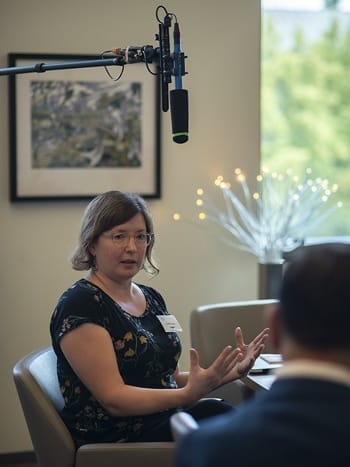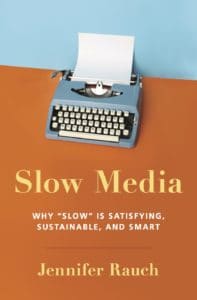Jennifer Rauch on why Slow Media is satisfying, sustainable and smart

Jennifer Rauch, author of a new book on Slow Media
In her new book, Slow Media: Why ‘Slow’ is Satisfying, Sustainable, and Smart, US journalism scholar Jennifer Rauch makes the case for rethinking the way media is both produced and consumed. We spoke to her about some of the ideas in her book.
Your book was partly inspired by an experiment in which you unplugged from digital media…
Several years ago the idea struck me to try living in the digital world but without digital media. I realised that I used to have all these analogue habits that fell by the wayside as I spent more time online, and thought that six months without digital media would give me the opportunity to focus on more material activities. I was inspired by an experiment I read about which saw researchers take some senior citizens on a retreat for a week and the participants were only allowed to use media from their youth. So they were reading old magazines, watching old TV shows, discussing old movies. By the end of the experiment the participants showed drastic improvements in physical and mental measurements such as memory, vision and flexibility. The researchers said the results were due to mindfulness; they weren’t studying media use per se. The experiment showed that anyone can enjoy those health benefits by paying more attention to their media environment. My Slow Media project was a personal version of that experiment.

Jennifer Rauch speaking at the Slow News conference in Eugene, Oregon, in June 2018. Photo: Abbie Winn
Can digital media be slow media?
Absolutely. The number one myth about Slow Media is that it’s anti-digital. Slow Media is like Slow Food in that it values diversity and permaculture. In the same way our soil is enriched when you grow lots of different things in different ways instead of having a monoculture, our society is enriched when we have a rich and diverse print and digital media. People can use digital media in slower ways; for example, they can turn off their alerts for their news, or check their email less frequently.
What can the media learn from the Slow Food movement?
Slow Food is my major inspiration. It embraces sustainability, not just human sustainability but ecological sustainability, too. The movement started with a focus on pleasure and good food, encouraging people to develop taste and be knowledgeable about the provenance of what they eat. But it’s evolved over time and now it emphasises the ecological concerns of food production. Carlo Petrini, one of the founders of Slow Food, uses this motto I love: ‘Good, clean, fair’. It promotes the idea that a product should not just be of good quality but also environmentally clean and ethically fair to the people who make it. A lot of media producers who are into Slow Media are excited about the ‘good’ part of that motto; it would be fantastic to see us move more towards ‘clean’ and ‘fair’ too.

How can news production be more sustainable?
Firstly, a lot of journalists aren’t finding their jobs sustainable – the pace of work, having to turn out stories quickly, being slaves to page views… Many aren’t getting to do the kind of in-depth, thoughtful, accurate reporting that drew them to the job in the first place, and on top of that they’re getting paltry pay. Also, a lot of people are finding their news habits aren’t sustainable – there’s so much news in circulation, much of which isn’t very good. Much news coverage is incomplete at best, inaccurate or misleading at worst. Too many news stories are dependent on press releases or official sources. You hear a lot about people getting news fatigue and avoiding the news because it makes them feel anxious.
There’s also the environmental side, thinking about all the materials that go into making media such as ink, fuel for delivery trucks, power for the office, the dumping of unsold copies… And some people don’t realise that digital media takes a big environmental toll, too – you wouldn’t believe all the raw materials used to make our devices, and all the energy and water used for the data centres all over the world. Data centres are the fastest growing contributor to global emissions. Their carbon footprint is larger than the airline industry’s.
How can we produce and consume media in a more mindful way?
If you consciously craft your news diet instead of just clicking on links that present themselves to you then the information that you get is going to be more enjoyable and credible and less anxiety-inducing. Choose your news, don’t let your news choose you. Also, if you want quality news that helps you understand how the world works and doesn’t just freak you out by telling you about shocking things every day, you should really consider paying for it. There’s the saying: if it’s free, you’re the product – and when media is free it’s usually because it relies on advertising, so you’re largely getting an advertiser’s view of the world. I recommend to people that they put together a news budget, an amount they spend each month so they can support the magazines they really enjoy, the broadcasters they love, and the websites that add value to their life.
Slow Media: Why ‘Slow’ is Satisfying, Sustainable, and Smart is published by Oxford Academic Press and available now. Rauch recently spoke with Alberto Puliafito, the director of a forthcoming documentary about Slow Journalism, at the Perugia Journalism Festival – the event can be viewed here.
Slow Journalism in your inbox, plus infographics, offers and more: sign up for the free DG newsletter. Sign me up
Thanks for signing up.





